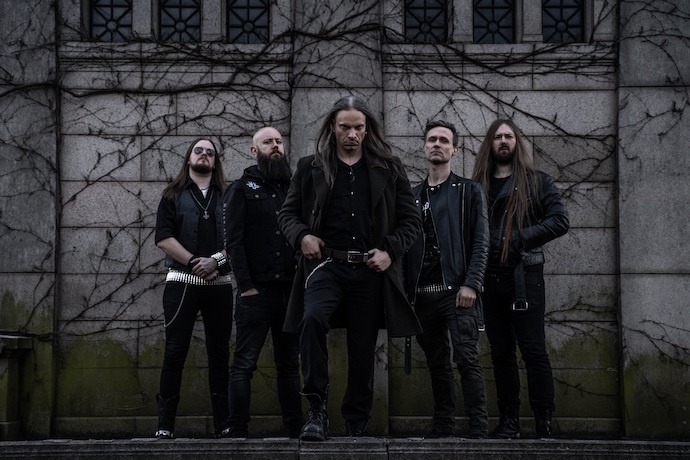
(In a couple of weeks from now Sweden’s Grand Harvest will release their debut album, and in a timely move Comrade Aleks caught up with them for the following interview.)
Armageddon, the End of Mankind, Luciferian Gnosis, Death – that’s how Metal-Archives sum up the lyrical themes of Grand Harvest. This band was formed in Sweden in 2017 by five men who gained experience playing in different local bands. This time they gathered under the death metal genre but a few years passed and Grand Harvest’s sound mutated in something different, bringing in certain doom metal influences and some less obvious blackened echoes.
Their debut album Consummatum Est is to be released on March 25th, and we hurried to organize the interview with this band right in time.
******
Hi Grand Harvest! How are you? What’s going on in the band’s camp now, when your debut album’s release is close at hand?
Greetings and thank you for your interest in Grand Harvest, N.N. here answering your questions. We’re busy at the moment – a lot of things need to be in sync to release an album on our own. Keeping track of everything and making sure that things get done is daily work right now. We’re also rehearsing for the release show on March 26 at Plan B here in our hometown of Malmö, Sweden – that will also feature Voodus and Cursus Bellum. Playing the whole album from start to finish means we need to play two songs that have never been in the live repertoire.
I know, I know… it’s a kind of a blunt move for me to ask, but what made you gather back then in 2017? Most of you played in different bands before, and here you are with your straightforward and damn hard death-doom in its most macabre form.
Thank you! Some of us have played together since way back, but the band became complete around 2017. The line-up was filled by both mutual acquaintances and by requests on social media. From the beginning the path of the band, in terms of style, was rather shaky. It started out as traditional Death Metal and then evolved into something much more intricate and profound. That development took a couple of years and we felt that we sounded like “us” sometime in 2019.
Which death metal bands shaped your taste towards this kind of music? Which aspects of death metal attracted you? Were you into aggressive and brutal stuff or were you into more technical and less bloody bands?
I think all of us have different stories to tell here. For me personally it has always been about the darkness, the scary eeriness and epic melodies, preferably with satanic, or at least philosophical/poetic, lyrics. That’s why I’m leaning way more towards Black Metal than Death Metal. Some Death Metal that I do like is old Morbid Angel, early At the Gates, Necros Christos (and Sijjin), Death, Dead Congregation, Taphos, Repugnant, Grotesque and Merciless (if they even count?) and so on. So not very brutal for me, no gore bands et cetera. Some of us do enjoy early work by Cannibal Corpse and similar stuff. We share a policy of each to their own. All of us have rather wide tastes in music generally.
If we take a look at your discography, it’s strange how you jump from the very first promotional demo (2018) to a live album, Vesperae Laesae Maiestatis Coronae – Live at Plan B 2020 (2020). What was your plan behind it?
Well, Grand Harvest is a band that embraces the strange and the unexpected. When we got on stage that night in 2020 we didn’t know that there would be any live album; we’d just put some time and money into planning a gig that would be streamed. The idea was to put it up on YouTube afterwards as a testament to our stage presence. When the sound guy at the venue said that he had recorded all the instruments on separate tracks it opened up all new possibilities. We could mix the sound and make it sound great.
Our manager, and sound engineer extraordinaire, Tore Stjerna, got to work and very quickly presented us with a result beyond our expectations – it then became clear that this should be an official release. We wanted to make ourselves known on streaming services and this was a great opportunity. The limited-edition cassette was a nice way to go beyond just a digital release.
Do you see Grand Harvest as a strong live band? When did you play live last time?
Yes, definitely. Our music elevates by adding the extra senses that come into play in a live setting. You see the band, you feel the music as much as you hear it, and you smell the incense smoke, et cetera. The visuals are important to us, we incorporate some of the more esoteric elements of the lyrics into our live performances and always aim to not be a boring band to watch, whether our music is one’s cup of tea or not.
Our last show was in Stockholm at the formidable club called Klubb Fredagsmangel on November 27 and a few weeks before that we supported Necrophobic and Avslut at their Malmö gig.
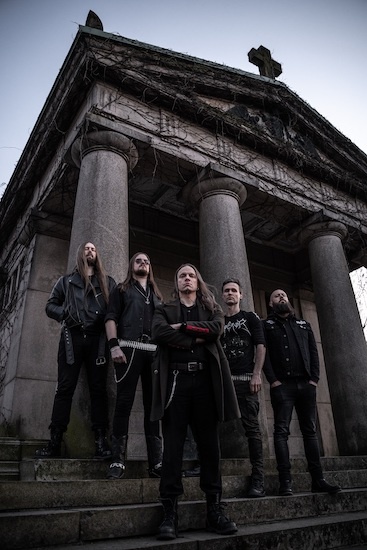
What was your biggest show? Did you play abroad?
Opening for Necrophobic/Avslut and Sinmara/Svartidauði have probably been the biggest ones so far in terms of audience size. We also worked very well with these bands both musically and personally. Hope we get to play together again some time.
We haven’t had any chance to play abroad yet, but we sure hope to in the near future. We’re only 20 minutes away from Copenhagen for example, so Denmark would be a logical next step.
Which role did Sweden Rock magazine play in Grand Harvest’s becoming? How much did you care for the band’s promotion? Sometimes it seems that even good promotion can’t help a good band to get out from deep under ground because there’s a market with its own rules.
Not a huge part in the band per se, but they’ve been very supportive from the start and helped us out a bit by mentioning us in interviews and what not. Since they are the biggest magazine in Sweden for metal/hard rock (the only big one in print) and also an international player in form of the festival it’s been encouraging for sure.
We’ve hired a bit of help for promoting the album release, but mainly we do a lot of our promotion ourselves. It’s admittedly hard to break through the constant feed of information people live with these days, but we work hard and hopefully it’ll shine through in the end.
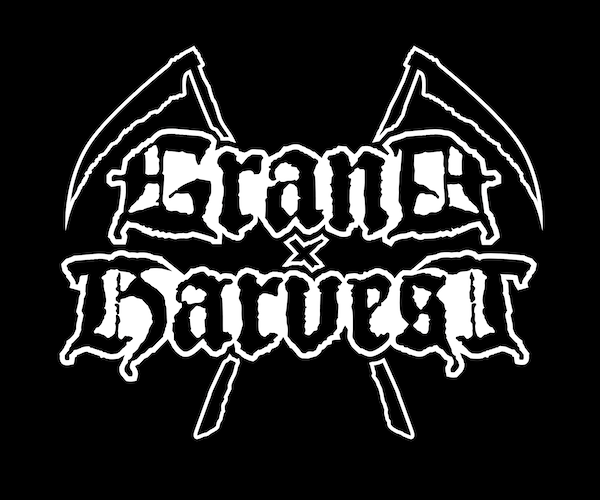
Did you aim from the start to this sound? Or did it evolve from other ideas? Like you know… The band is tagged as death-doom but you wanted initially to play just death metal and those slower parts happened accidentally? Ah, it’s 2022 and “journalists” still hold for tags and genres! At least I do!
As I mentioned earlier it started out as pure Death Metal, with influences such as Bolt Thrower, Immolation, and the likes. That evolved into something else during the two first years of the band’s existence. This development came about for a few reasons.
First of all, some of us don’t really enjoy that many pure Death Metal bands, it gets much more interesting when mixed up with other genres. Second, the lyrics evolved into something deeper and more profound, which kind of demanded that the music would do the same. Third, we’ve always had one guitar player more oriented towards Black Metal and one more oriented towards Death Metal – this does something to the song writing, and the meeting of sound somewhere in the middle of that is where it’s all happening for us.
The Doom parts come from the fact that we like to play slow stuff, the heaviness is mesmerizing – especially when played live. It somehow densities the darkness. The variety of the music is mainly there to accompany the lyrics, which contain several different emotions and mindsets which all call for their own different sonic landscape.
You say that “some of you don’t really enjoy that many pure death metal bands”. Can you tell some cliches which you find annoying?
For me personally I prefer music to focus on atmosphere rather on being “hard” or “riffy”. It just appeals to me more. I’m also a fan of thought through lyrics, rather than the gore/brutality, or even humor, themed ones you often find in “pure” Death Metal. Of course, there’s shining examples of the opposite – look at Necros Christos for example.
The live album contains a few songs which are included in Consummatum Est. How much time did you spend on writing and recording this material? When did you decide that the album was finished?
Yes, actually all the songs from the live album are on Consummatum Est. The writing of the album was done at the end of 2019 and it got recorded in spring 2020. The pandemic then basically put a lid on most of our efforts, so that’s why it hasn’t been released until now. We hope to be able to get out and play live properly again now and then find a suitable label, so that we can focus more on the music and less on the administration for the next album.
We’ve put a lot of time and effort into writing the album. It contains songs written over a long period of time, but it all still sounds like “us”. Some songs got scrapped along the way and some stayed and got worked on in the rehearsal room until they felt finished. To us the songs usually get finished when we’ve recorded a demo of it that “feels done”. Not too basic and not over-worked is the key.
Once the songs got recorded in a proper studio and Tore put his touch on the mix, the album was definitely finished. To hear the end result was an instant relief and gratification. All our hard work paid off in the end.
How do you see the strong sides of Consummatum Est? What’s most fascinating for you in this material?
The versatility and atmosphere are the things I’m most proud of myself. The focus on lyrical content and how well the final mix turned out are also noticeable perks to the album. In a way the album shows both where we come from and in what direction we’re heading henceforth.
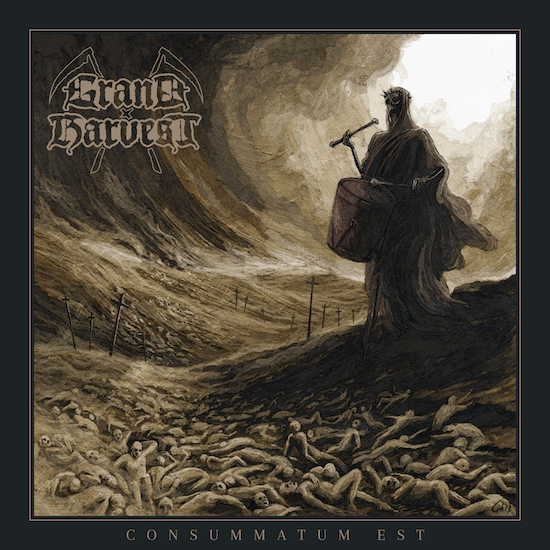
The official press-kit points out that you “pay extra attention to the esoteric aspects of the lyrics, which perfectly blend with the music and present the different vocal styles – and Luciferian / misanthropic mindset – of singer and lyricist Dr. Häll”. Are you really esoteric and serious about that?
Like all esoteric and magic work, some of this should remain in the shadows. It’s up to the reader of the lyrics to find the pathways within them. What can be said is that Dr. Häll has been a practitioner and writer within the field, and history, of magic and esoterism for over a decade. The esoteric elements shine through in the lyrics, the artwork and layout of the album (besides the digital release there will be an elaborate CD version, and there are plans for a vinyl further down the road if no one else wants to help us release that) as well as in our live performances.
Not all members of the band are practitioners, but we all have a great respect for the elements and energies that the music and lyrics project.
Do you believe in the “transformative” power of music? How does death metal influence your own?
Definitely. Music’s ability to invoke feelings and emotions is a kind of magic in itself. Most sacral work, from religion to private rituals, involve some sort of music or at least notes/tones/rhythm. There’s of course a reason for this. Music connects to the inner being and our primal emotions, which can be used for both commercial and spiritual purposes.
Death metal can undoubtedly hold these aspects within itself. The sonic impression of Death Metal is very overwhelming, which could be charged with profound content if used in specific ways. That’s the biggest plus with Death Metal as a whole – it’s ability to be complex and “dense” in its darkness.
What’s “Luciferian gnosis of death” about?
This is a general description that Dr. Häll has chosen for the philosophy portrayed in the lyrics as a whole. It is not a fixed ideology or belief system, but rather the philosophic ground on which the lyrics are built. This is something that Dr. Häll has conjured around years of practice and studying of not just Luciferian/necrosophical practice and the occult, but also history, philosophy, art, poetry and literature.
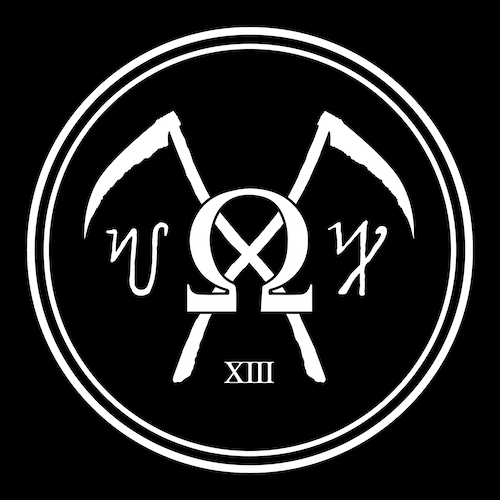
That sounds too serious! What was the last book you read?
I don’t know about the “too”, but it’s definitely serious. I think it’s possible to be serious without being overly pretentious. The last book I read was Nightside of the Runes: Uthark, Adulruna and the Gothic Cabbala by Thomas Karlsson.
How do you feel – which qualities of your music help to channel this “necrosophical” message? Can we consider this gnosis Grand Harvest’s agenda at all?
The main purpose of our music is to always blend with the lyrics. The music is there to elevate and portray the essence of the lyrical content. This can be achieved in different ways. Sometimes we start with a conceptual idea first and sometimes Dr. Häll molds the lyrics after a piece of music that’s already written. Usually we change the music around to best fit the lyrics in these latter cases.
I wouldn’t say that it’s an agenda, but more of a philosophical framework that permeates everything we do. It’s present for those who seek it but isn’t propagandistic for those who don’t.
Okay, thank you for this interview N.N.! I wish you a productive 2022 and let your Harvest be Grand! Would you like to add few more words for readers?
Thanks again for the interest in Grand Harvest! I hope some readers find this interview interesting enough to look us up further if they haven’t already. Please like and follow us on Facebook, Instagram and Spotify to not miss future updates and concerts, et cetera. Hopefully we’ll do a live performance somewhere near most of you in the near future.
https://www.facebook.com/grandharvest.band/
https://grandharvest.bandcamp.com/releases
